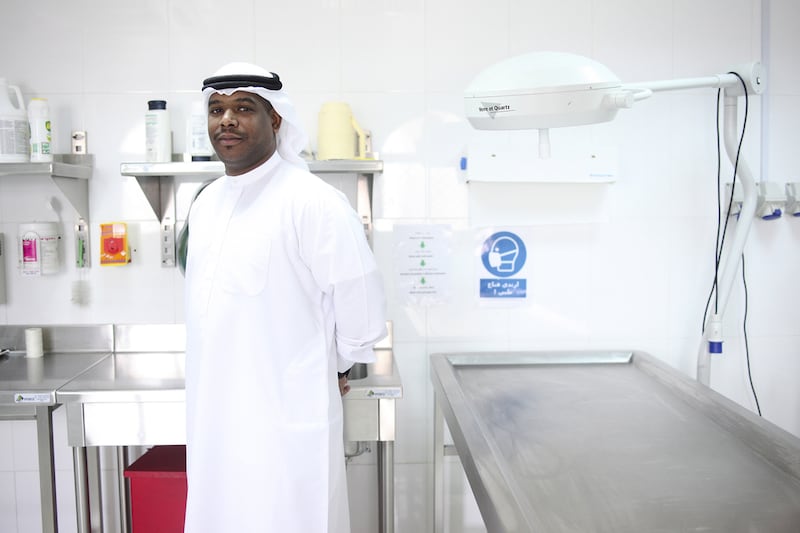ABU DHABI // Of the more unlikely jobs that Emiratis would hold, one would expect mortuary technician near the top of the list.
Yet, 12 of 33 employees in Abu Dhabi’s five mortuaries are UAE nationals and applications arrive from Emiratis almost every week.
“The title doesn’t sound as glamorous as, say, working for Mubadala or the Health Authority – Abu Dhabi (Haad), and there is still a stigma attached to working at a mortuary, but the more Emiratis know the truth of the matter, the more they are interested in working at the mortuary,” said Jaber Al Lamki, acting director of customer care at Haad.
The truth of the matter, he said, is that the job does not only entail dealing with bodies, but with grieving families during their most difficult times.
The largest mortuary in the emirate is at Sheikh Khalifa Medical City (SKMC), and there are four others, at Mafraq hospital, Al Ain hospital, Madinat Zayed and soon Al Rahba hospital.
At SKMC, the environment is clinical. There are separate waiting areas for men and women, people behind long counters issuing death certificates, all very business-like.
It is only once a visitor goes beyond two secure doors at the opposite end of the waiting rooms that the reality of the mortuary becomes clear. This is a place where autopsies are performed, where bodies are stored, washed, embalmed and reconstructed.
Marwan Al Marzouqi, section head of mortuary services and the first Emirati to work at the mortuary, describes it as the clean area and the dirty area.
“Behind the doors it is the dirty area,” he said. “Dirty in the sense that everything behind these doors must be sterilised and hygienically controlled.”
There are more rooms behind the doors, each with a different purpose. One is for washing bodies before burial and another for autopsies and embalming.
The largest room is lined by refrigerators and freezers, 76 in total.
Haad hopes to eventually have a staff that is 100 per cent Emirati.
“The mortuary is one of the most difficult working environments. Not everyone can work in the mortuary and it has been a challenge,” Mr Al Lamki said.
“We were asked by the authority how we can ensure business continuity from an Emiratisation point of view.
“It is also risky to open a mortuary from an infection point of view. It’s a highly sophisticated, controlled environment – there are tissues, liquids, severed limbs – so there is a high risk of contamination. It is a job where we cannot take risks.”
The Emiratis working at the mortuary, he said, are the “creme de la creme”.
The job of a mortuary worker can be messy. They go to crime scenes and help the police pick up remains. It is not unusual to handle bodies that have been burned, decomposed or are severely damaged. Most difficult of all, though, is dealing with the grieving families.
“The staff are a credit to the country who willingly want to work in such an environment,” Mr Al Lamki said.
He hopes more will be hired, particularly women.
“Today there are women working in every sector, they are in the military, doctors, pilots. We want them to join the mortuary.”
He said that due to “cultural sensitivities”, families would prefer a woman handling the body of a female relative.
“What we are looking for is a minimum of a high school degree. They are not allowed into the position immediately unless they go through a proper training programme.”
The Emiratisation process began in 2013, when Mr Al Marzouqi was hired.
“My job is to create as a nice cooperative environment,” he said. “I motivate staff and tell them that when families come in, we need to calm them down.”
He admitted that he was hesitant when he first joined.
“Everyday you are helping people and help ease their sorrow. It’s not all about dealing with bodies. It’s the human interaction as well.”
salnuwais@thenational.ae






